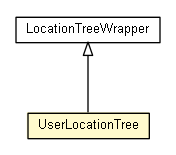
|
||||||||||
| PREV CLASS NEXT CLASS | FRAMES NO FRAMES | |||||||||
| SUMMARY: NESTED | FIELD | CONSTR | METHOD | DETAIL: FIELD | CONSTR | METHOD | |||||||||

java.lang.Objectorg.security.session.manager.helpers.LocationTreeWrapper
org.security.session.manager.helpers.UserLocationTree
public class UserLocationTree
Extends LocationTreeWrapper to add a Set of Users to
each node in the tree.
In addition it manages the Allocation and Deallocation of users in the Location tree.
| Field Summary |
|---|
| Fields inherited from class org.security.session.manager.helpers.LocationTreeWrapper |
|---|
loc |
| Constructor Summary | |
|---|---|
UserLocationTree(Location l)
Model the given Location. |
|
| Method Summary | |
|---|---|
void |
addUser(User u)
Add a single User to this Location. |
Set<User> |
allocateUser(User u)
Allocate a user in the Location tree, this means the user is logically
located in all of the parent locations of this location. |
Set<User> |
deallocateUser(User u)
Remove the User from the whole Location tree. |
UserLocationTree |
getMaxUser(User u)
Calculate the uppermost Location in which the User is alone. |
Set<User> |
getUserSet()
The user set is stored as a List in the actual Location
instance, so this methods helps reformat that into a Set. |
void |
setUserSet(Set<User> users)
Complement to getUserSet(). |
| Methods inherited from class org.security.session.manager.helpers.LocationTreeWrapper |
|---|
equals, getChildren, getLocation, getParent, getRoot, isRoot |
| Methods inherited from class java.lang.Object |
|---|
clone, equals, finalize, getClass, hashCode, notify, notifyAll, toString, wait, wait, wait |
| Constructor Detail |
|---|
public UserLocationTree(Location l)
Location.
l - | Method Detail |
|---|
public Set<User> getUserSet()
List in the actual Location
instance, so this methods helps reformat that into a Set.
public void setUserSet(Set<User> users)
getUserSet().
users - public void addUser(User u)
User to this Location.
u - public Set<User> deallocateUser(User u)
User from the whole Location tree.
There may be users affected by this movement, since they might be alone now
that the other user is deallocated.
u - the user to be removed.
Set of Users affected.public Set<User> allocateUser(User u)
Location tree, this means the user is logically
located in all of the parent locations of this location.
But all children locations must be marked too.
u - the allocated user.
Users by this allocation.public UserLocationTree getMaxUser(User u)
Location in which the User is alone.
u -
UserLocationTree where the user is alone,
null if it is not in the location tree, or she/he is not alone anywhere.
TODO add delegation logic here.
|
||||||||||
| PREV CLASS NEXT CLASS | FRAMES NO FRAMES | |||||||||
| SUMMARY: NESTED | FIELD | CONSTR | METHOD | DETAIL: FIELD | CONSTR | METHOD | |||||||||